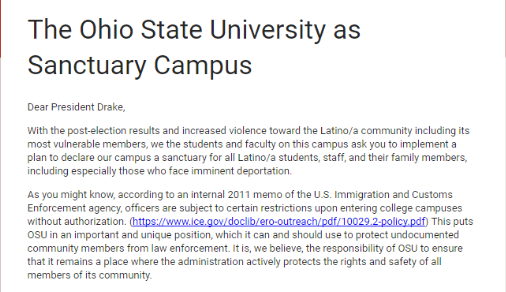
The petition Ohio State students and faculty sent University President Michael Drake calls for the protection of undocumented students. Screenshot: Alexa Mavrogianis | Photo Editor
As President-elect Donald Trump rolls out his transition into office, questions are in the air regarding how his policies proposed on the campaign trail might come to fruition. While Trump has backed away from a wall along Mexico’s border, stricter illegal-immigration enforcement still could still come about in other ways, potentially on campus.
That’s the worry of hundreds of students who have signed an online petition asking Ohio State to make its campus a “sanctuary campus” — offering protection against deportation — for students who immigrated to the United States illegally. How much this petition could potentially help, however, is unclear.
Anna Babel, assistant professor Hispanic linguistics, is listed as the second person to have signed the petition.
“One reason (I signed) is to protect our students. Immigration regulations change continually, and people might actually move back and forth between documented and undocumented status,” Babel said. “So we don’t want our students to feel that additional insecurity of worrying that they may be vulnerable while they’re on campus. We really want people to focus on their studies, make sure they’re doing well in school and become the best prepared graduates that they possibly can be.”
Some of the requests the petition makes of OSU, however, relate to federal and state policies, not university policies. For example, the petition calls for undocumented students and students protected under the Deferred Action for Childhood Arrivals policy — a 2012 executive order signed by President Barack Obama which protects and documents people who came illegally to the U.S. as children from deportation for a renewable period of two years — to be included in “all merit, university and diversity initiative scholarship eligibility.” DACA-protected students can pay in-state tuition in the state of Ohio in some cases, but, along with undocumented students, they cannot receive state or federal financial aid.
OSU issued a statement saying it supported DACA students, but declined to elaborate further on potential holes in the petition and how exactly the university could respond to all the requests being made of it.
“By definition, these individuals arrived as children and have grown up working to make real the American Dream. We support them strongly and are committed to their success,” the statement reads. “We also support strongly those programs that have been established to help them achieve their goals. Ohio State is engaged in active dialogue with our peers and policymakers around the country, and we continue to closely monitor this important issue.”
As far as the protection of students based on their immigration status, university spokesman Chris Davey said that, to his knowledge, OSU is not aware of how many students are protected under DACA.
Regardless of the actual feasibility of some of the petition’s demands, Babel said she felt signing the petition carried a certain weight.
“It’s kind of a symbolic action, to show that OSU stands in solidarity with immigrants and that OSU supports the Latino community in Columbus, including those who are involved on campus — not just students but also staff and faculty,” she said.
Luis Macias, a graduate research associate from the College of Education and Human Ecology, said parts of this petition spoke to him on a personal level, citing things such as the calls for inclusivity and institutionalized protection. He described the petition is “intersectional,” as it’s not just for the Latino/a community, but any minority community that might face discrimination.
David Filipi, the director of film and video at the Wexner Center for the Arts, also signed the petition and echoed the thoughts of Macias. Parts of the petition such as creating safe spaces for students and inclusivity were especially important, he said, as he feels no one — student, faculty or staff — should feel unsafe while on campus.
“People of color and people in the LGBT community are not, of course, are not new to living with systemic bigotry, but the election has emboldened some to feel that they have a new license to act out against minorities and immigrant populations. This can’t be tolerated,” said Filipi, who emphasized he was speaking only for himself, and not for the Wex, in an email. “Acts of harassment need to be reported, recorded and dealt with immediately.”
Filipi also said he believes that students should have a place where they can gather to study or socialize and not worry that they will be harassed. While Macias agreed students should gather and share stories and concerns, he said conversations alone aren’t enough.
“I don’t think having conversations just to have conversations is very productive. That’s step one,” Macias said. “Step two is to take the voices that have been shared in those conversations and see how some our policies and some of our practices are creating some of the stories that we are hearing.”


